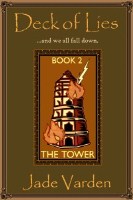Vanity Fair is considered a classic, but don't assume that means it's boring. It was originally written as a comedy, and it features one of the most famously conniving characters in literature. Many authors have been inspired by William Makepeace Thackeray's famous anti-heroine, Becky Sharp.
The Book
Written in 1848, Vanity Fair takes place in the first half of the 1800s. At the beginning, we find Becky Sharp and Amelia Sedley, two friends who have attended Miss Pinkerton's Academy for Young Ladies together. They're leaving school to go to Amelia's house.
It's a bit of a strange friendship. Becky Sharp matches her name: she thinks quickly, and she's ambitious. Amelia, by contrast, is simple and sweet. Upon arriving at the Sedley home, Becky meets Captain George Osborne. He and Amelia have been engaged since they were children. Joseph, Amelia's brother, is also here.
Becky attempts to woo the brother, but it all falls apart. Some of it is due to the meddling of Osborne, who warns him away, and the fact that Sedley's as sweet and simple as his sister -- he can't even tell when a pretty girl is flirting with him.
With no marriage proposals in the offing, Becky has to find some means of employment. She begins to work for Sit Pitt Crawley as a governess to his children. Becky endears herself to the grumpy old man, and he proposes to her after his wife dies.
It's too late. Becky's been hard at work behind the scenes of the Crawley home, and she's already secretly married to Crawley's handsome second son Rawdon. He's the favored relative of a very rich aunt, Sir Pitt's sister. But instead of being happy about the marriage, as Becky had hoped, the old woman is infuriated. She disinherits Rawdon.
Meanwhile, Amelia's life hasn't worked out as planned. The Sedleys have fallen on financial hard times, and their ties with the Osborune family are strained. Amelia's engagement to George is broken by the Osborne family. George, however, is goaded into marrying her anyway by his friend Dobbin, who believes in honor. George is disinherited as a result.
And in the background, the Napoleonic Wars are beginning. Osborne and Dobbin are sent to Brussels. On their way to deployment, the pair run into Becky and Rawdon. George makes advances toward Becky, who flirts back. George slips her a note telling her to run away with him.
He goes to Waterloo the next day. Becky tries to spend time with Amelia, but she's angry because George is attracted to her friend. George dies in the famous battle, shortly before Amelia gives birth to their son. She names him George and goes to live with her parents. Dobbin spends his days trying to woo her in very gentle ways, but it's wasted. Amelia is in love with the memory of the man that George never was. Years go by in this fashion, and the rift between her and Becky extends. Dobby eventually leaves and goes to India to get the memory of Amelia out of his head.
Becky has had a son as well, but she's a very different mother than loving Amelia. She goes to Paris, and London, on her continuing quest to become well-settled and rich. She does this by flirting with various men, climbing them up the social ladder, until she is introduced around London society by the Marquis of Steyne. Becky is even presented to the Prince Regent.
Becky and Rawdon look respectable on the surface, but it's a sham. They're con artists who gamble and cheat to earn money, while Becky collects trinkets from various men and pawns them for extra scratch. She loves credit, especially when she can use it in other people's names. Rawdon is arrested for their debts and bailed out by his sister Lady Jane.
It's rather unfortunate, because Becky didn't expect him back. She's carrying on in a most scandalous manner with the Marquis, only to be caught by Rawdon at a most inopportune moment. He leaves her, of course. After Rawdon challenges the Marquis to a duel, Steyne tells Becky to get out of the UK altogether. She does, but it doesn't matter. Steyne follows her across Europe, destroying her reputation wherever she goes.
After 12 years away, Dobbin finally returns to England. He goes to Amelia and confesses his love, plainly this time, but she turns him down. She's still in love with George, even after all this time. Dobbin takes her and her son George on a trip to Germany along with Joseph Sedley, where they run into Becky Sharp again.
She's destitute, but still charming. She's even capable of enchanting Joseph Sedley despite the fact that she's a hard-core boozer who's lost her singing voice and much of her pretty looks.
At this point, Becky finally does something good. Feeling sorry for Amelia and plainly seeing Dobbin's torment, she shows Amelia the note George gave her all those years ago. Amelia realizes she's been mourning a man who never really existed, and she contacts Dobbin.
Becky marries Joseph Sedley. After naming her his inheritor, he dies under very suspicious circumstances and at last Becky has what she wanted. Due to the quirks of Fate, Becky's son ends up inheriting the Crawley titles and fortune.
It's a story filled with ups and downs, rich characters and a plot that zigzags throughout Europe. It's a natural choice for any filmmaker. This is evident by the amount of filmmakers who have adapted it.
The Films
Vanity Fair was four different silent films, made in 1911, again in 1915, in 1922 and yet again in 1923. Once talking pictures were invented, everything that was done had to be done again. The first sound version of Vanity Fair was made in 1932 with Myrna Loy, a huge star in her day. This, however, is one of her very early films.
The story was adapted again in 1935, re-titled Becky Sharp this time. Miriam Hopkins was chosen for the title role. This was the very fist feature film shot in full-spectrum Technicolor, so it's very lavish. Her performance was nominated for an Oscar.
Then, Hollywood forgot all about it for awhile. They remembered the story in 2004 and decided to make the movie again. This time, Reese Witherspoon is Becky Sharp. A century has apparently softened Becky; in this version, she's not so much anti-hero as she is victim.
She also doesn't attend school with Amelia in this version. After leaving school, rather dramatically, Becky rides in a carriage alone to her friend's home. She still meets Joseph and George, along with Dobbin. Becky does go on to be a governess and secretly marries Rawdon, and the pre-Waterloo outing does occur.
But this time around, Becky stays in Brussels to take care of Amelia. The big fight between them does not occur, and their friendship remains intact. Becky looks like a kind and caring friend in this version, lying to Amelia about George's fidelity, in a huge deviation from the Becky of the book. Rawdon is again thrown in debtor's prison, and again catches his wife in the arms of another man.
Becky is indeed in Germany 12 years later, but her circumstances are much improved in this version. For one, she's still beautiful and she has a steady enough job. It's the young George Osborne who finds her in this version of the story. Becky tells Amelia the truth about George, and Amelia goes running to Dobbin once more.
Joseph Sedley marries Becky, and they go off to India together to live happily. In an alternate ending, Becky returns to the Crawley home to find out that her son (Robert Pattinson) has inherited. He shuns her at first, then takes her hand. Pattinson once said that it was Reese Witherspoon who had him cut from the film.
What Got Adapted?
The 2004 version of the story is a sight to behold. No expense was spared in costuming and set design, and Witherspoon looks fabulous throughout. But the watered-down and victimized version of Becky Sharp isn't true to the original spirit of the novel, which shows Becky as a cunning little climber who's practically sociopathic in her selfishness.
The friendship between the two women is also strengthened, with Becky being a much better friend in this adapted version. They never quarrel, and it seems to fit with Becky's character when she reveals the truth about George. In the book, it's actually the one good thing Becky does with her self-centered life, a single shining moment of redemption.
Steyne is painted as a villain, manipulating Becky so that he can prey upon her. In the book, Becky is the one pulling the strings and at the very least, a very willing participant.
Then of course, there's the ending. In 2004, Becky Sharp rides of with Sedley. She's freed Amelia from grief, she's made young George happy and she's still lovely. In the book, Becky uses and kills her new husband. She's an anti-hero and a bad girl, but not in the film version.
But of course, it is Reese Witherspoon. So I encourage you to watch the film and read the book, and meet both versions of the infamous Becky Sharp.


















